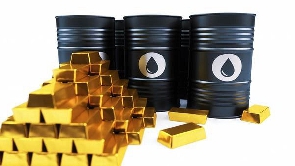 The gold-for-oil policy is aimed at addressing Ghana's cedi depreciation
The gold-for-oil policy is aimed at addressing Ghana's cedi depreciation
Research and policy analyst at the Institute for Energy Security, Adam Yakubu, has bemoaned over the lack of transparency from the government on the “Gold for Oil” policy.
According to him, the explainers and actions from the government do not underline the basic concept of the policy as earlier indicated.
In an exclusive interview with e.tv Ghana’s Samuel Eshun on the Happy Morning Show, Adam Yakubu reiterated that despite the concerns and signals raised by experts including the Institute for Energy Security, the government has been hesitant to consider the inputs of civil society groups.
“The Gold for Oil policy as announced by the government has continuously kept changing from what we know originally. We were made to believe that government is going to use our gold in exchange for finished petroleum products on the international market. Which in the industry is called a barter arrangement where one commodity is used in exchange for finished product,” he told Samuel Eshun.
“However, we sounded cautious that such an arrangement is something that is not transparent enough for an industry such as this, this is very volatile. We also alluded to fears that this could spill over problems in the petroleum or energy sector into the national resources sector which are all critical sectors of the country’s economy,” he added.
Mr. Yakubu further indicated that despite the calls for broad consultations with industry players before implementing the policy, the government has consistently ignored their attempts. Hence the latest development of paid cash for 40,000 tons of oil instead of gold comes as no surprise.
Vice President Dr. Mahamudu Bawumia announced the barter policy last year, which sees Ghana pay for imported oil products with gold instead of relying on the country’s US Dollar reserves – a move experts say will help the country in many ways.
According to Andrew Egyapa Mercer, the Deputy Energy Minister, the first shipment of 40,000 tonnes of oil imported into the nation under the “Gold for Oil” policy was paid for in cash rather than gold.
He made this revelation in response to repeated requests from industry professionals, including the Institute of Energy Securities and COPEC, who questioned the sustainability of the agreement and urged the government to reveal the amount of gold it traded for the 40,000 metric tonnes of fuel.
The Minority in Parliament also questioned the policy’s viability, claiming that it won’t have an impact on the current pump prices.
The Deputy Energy Minister has however strongly rejected the reports attributed to him, describing the headline on his Facebook page as “pure mischief.”